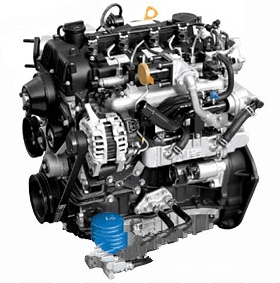Hyundai KIA 2.2L CRDi Engine (D4HB) Specs, Problems, Reliability. The Hyundai 2.2 CRDi (D4HB engine) is a 2.2-liter four-cylinder turbocharged diesel motor belonged to Hyundai’s R family and produced since 2009. It is offered mostly for Hyundai’s and KIA’s SUVs and crossovers (Hyundai Santa Fe, Hyundai Palisade and Kia Sorento). The 2.2 L diesel engine is produced at Hyundai’s plant in South Korea together with 2.0-liter version – the 2.0 CRDi D4HA engine.
The D4HB engine has a compacted graphite iron cylinder block. The compacted graphite iron material is lighter than cast iron and supplies higher strength, which is necessary for heavy-loaded diesel engines. For vibration reduction, there is a lower balancer shaft fitted inside stiffened ladder frame real estate mounted at the bottom side of the 2.2 CRDi engine block. On top of the block, there is a light-weight 16-valve DOHC cylinder head.
The intake and exhaust camshafts are chain driven. The valvetrain is equipped with hydraulic camera followers (no requirements for valve clearance modification). For the fuel delivery, the engine utilizes Bosch 3rd-generation common rail direct injection (CRDi) system coming with piezo-electronic injectors. The digitally controlled fuel system operates under really high pressure (approximately 1800 bar). To squeeze out the maximum power and minimize turbo lag effect, the 2.2 CRDi engine was equipped with a digitally handled variable geometry turbocharger (e-VGT).
Engineers looked after weight loss and used plastic product for some elements manufacturing. There are a plastic cylinder head cover, plastic oil filter housing and plastic intake manifold. More strict emission rules (Euro 5 and following) required a close-coupled diesel particulate filter (DPF) installation in addition to an exhaust gas recirculation (EGR). To sum up, the engine has modern technical services and electronic systems that offer great efficiency in combination with low fuel intake and emissions.
Table of Contents
Hyundai Kia 2.2 L CRDi Engine Problems and Reliability
The engine has fairly good reliability and in general, has no severe defects in the style. Some problems might still happen. Let’s start with undesirable functions. The D4HB engine is noisy. All operation noise is produced mainly by valvetrain and timing chain. Sometimes, bad oil obstructs the channel of the hydraulic tensioner circuit and the sound is significantly improved.
The piezo-electronic injectors might trigger unsteady operation of the engine. Replacing these injectors is quite pricey and needs specific service. To prevent any problems with a contemporary fuel system, simply fill the tank with top quality fuel in tested places. The 2.2 CDRi also enjoys to take in oil. Absolutely nothing crucial, however if you actively press the gas pedal and usage traffic signal for some sort of racing, be gotten ready for oil usage of as much as 0.5 liters per 1000 km (600 miles).
The producer declares the engine life of 150,000 miles (250,000 km). The real life shows what the engine easy goes beyond these numbers.
you must see more engine detail in here: Engine – US Cars News or you can see on wiki here
Hyundai KIA 2.2L CRDi Engine (D4HB) Specs
| Manufacturer | Hyundai Motor Co. |
| Production years | 2009-present day |
| Cylinder block material | Compacted graphite iron |
| Cylinder head material | Aluminum |
| Fuel type | Diesel |
| Fuel system | Common rail direct injection |
| Configuration | Inline |
| Number of cylinders | 4 |
| Valves per cylinder | 4 |
| Valvetrain layout | DOHC |
| Bore, mm | 85.4 mm (3.40 in) |
| Stroke, mm | 96.0 mm (3.80 in) |
| Displacement, cc | 2,199 cc (134 cu in) |
| Type of internal combustion engine | Four-stroke, turbocharged |
| Compression Ratio | 16.0:1 |
| Power, hp | 197 hp (147 kW)/3,800 |
| Torque, lb ft | 310-325 lb-ft (420-440 Nm)/1,800-3,500 |
| Engine weight | – |
| Firing order | 1-3-4-2 |
| Engine oil weight | 5W-30, 5W-40 |
| Engine oil capacity, liter | 6.7l (0.7l – oil filter) |
| Oil change interval, mile | 9,000/15,000 (15,000/30,000 km) / 12/24 months |
| Applications | Hyundai Santa Fe, Hyundai Grandeur, Hyundai Palisade, Hyundai Sonata, Kia Carnival/Sedona, Kia Sorento |


